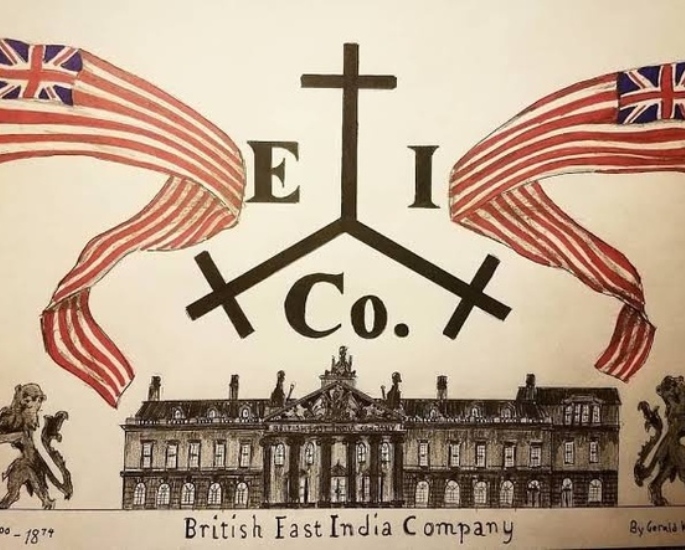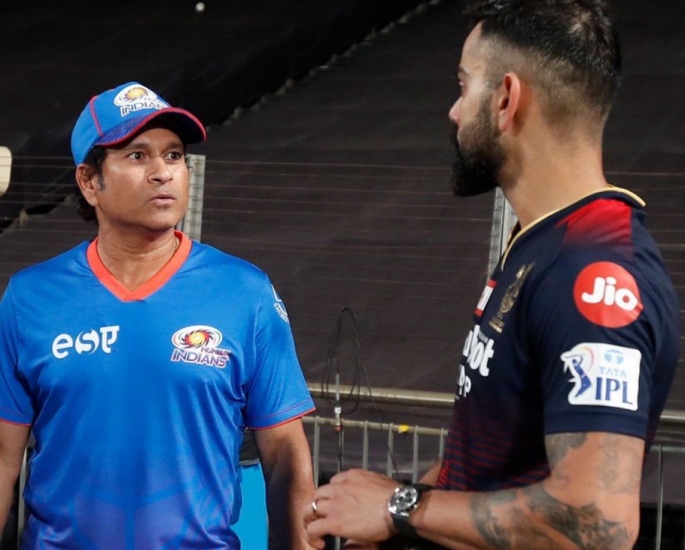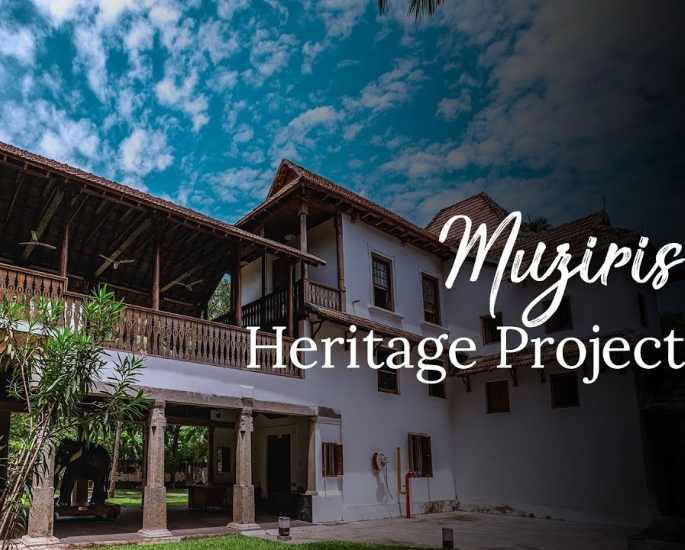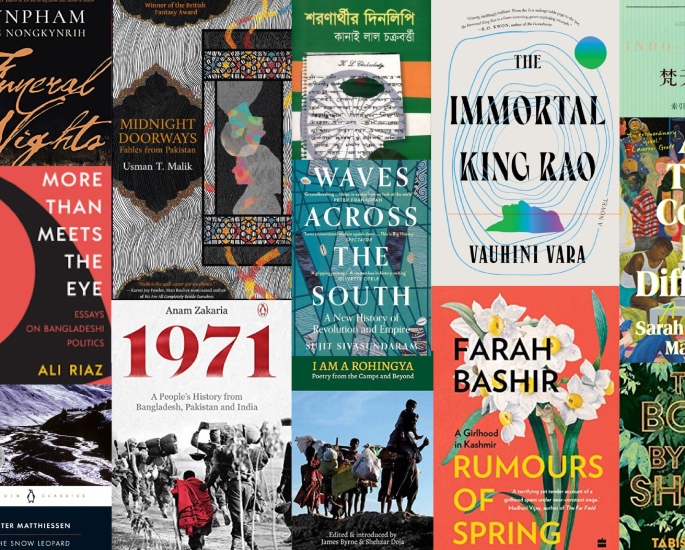"As the book progresses, the stakes get higher"
Hamish Morjaria, born and raised in North London, spent 30 years immersed in the business world, working with leading brands and retailers.
However, it was his passion for ancient history and a penchant for fast-paced thrillers that ignited the spark leading to the creation of an enthralling trilogy.
The Muziris Empire, the first instalment in The Harveen Gill Mysteries, is slated for a summer 2024 release after Pan Macmillan India acquired world rights in a pre-empt.
The trilogy unfolds an edge-of-the-seat narrative, rooted in ancient Indian history, blending conspiracy theories and ancient secrets.
At the centre of the storm is Dr Harveen Gill, an ambitious Indian archaeologist racing against time to unravel a discovery that could change the course of history.
Set against the backdrop of Muziris, Southern India, and moving back and forth in time, the series promises an alchemy of mythology, science, and cryptography.
As the rebellious Harveen Gill pursues her quest for fame and glory, the Vatican watches closely, setting the stage for a clash between science and cultural interests.
The acquisition of The Harveen Gill Mysteries has not only sparked excitement within the literary world but has transcended into the realm of cinema.
Parmar Entertainment and Impact Films are set to bring Hamish Morjaria’s intricate narrative to life on the big screen in 2025.
With such an incredible trajectory in a short amount of time, we spoke to Hamish about Indian history, the Harveen Gill Mysteries, and diversity within this space.
What led to the fusion of ancient Indian history and conspiracy theories in this trilogy?

The original inspiration came from helping my son with his school history projects and seeing the lack of representation in the textbooks.
All of the main periods that are regularly covered in school like Rome, the Tudors, the Greeks and the World Wars are depicted without any diversity.
Yet we know that there were people from all over the world playing very active roles in all aspects of history.
From a personal perspective, the lack of South Asian representation in popular films, TV, books and school when I was growing up, made it more difficult to understand my place in the world.
I think it is important for the global diaspora that this balance is redressed.
Popular Indian history tends to focus on the period post 1600 with the rise of the East India Company and the British Empire.
There are amazing stories from this part of history.
But they do inevitably focus on the trauma stories and to an extent have to have an opinion on Empire and its impact.
The period of history stretching back two or even three thousand years before this is less well known but, for me, far more fascinating.
India accounted for 20-30% of global GDP in this period and was pretty resilient to the various Empires that came and went.
“I found the story of Muziris captivating.”
Here was a place on the southern tip of India that was one of the biggest trading ports in the world.
Looking at the source materials, there were traders from all over India, as well as Romans, Greeks, Jews and even the first Chinese sailors in this one place trying to make their fortunes.
Early Tamil poetry describes Muziris as;
‘…the city that bestows wealth to its visitors indiscriminately, and the merchants of the mountains, and the merchants of the sea, the city where liquor abounds.’
From the very first weeks of my research, it was clear that this was the place that would be the start of my trilogy.
How hard was it to weave mythology, science and cryptography?
We have been very kindly compared to major books and films like The DaVinci Code, RRR and the Indiana Jones series.
I hope that readers can have a similar experience with The Muziris Empire.
I hope that readers will be able to enjoy a thrilling adventure with a new heroine and turn the pages deep into the night.
The challenge with blending mythology, science, religion and cryptography into the book was to keep it light enough that all readers can just enjoy the story, whilst inspiring those with an interest to delve deeper into those aspects.
The final edits on the book were all really focused on making this an edge-of-the-seat adventure.
What aspects of Dr Harven Gill do you find most compelling?

I feel that India is changing as a country and that Prime Minister Modi is a primary catalyst for that change.
He seems to understand the importance of making major visual changes such as moving the Indian Parliament out of the colonial era buildings designed by Edwin Lutyens into a modern, purpose-built complex.
There is also a growing desire to recapture the history of India and frame it from an Indian perspective.
The initiative to recreate first-century ‘stitched ships’ by The Indian Navy and the Ministry of Culture will bring to life some of these ancient stories.
“There is also a cultural shift that is best captured in our favourite sport.”
Growing up, our heroes were Kapil Dev and Sachin.
They were replaced with M.S. and Virat and now, for the first time, the new generation of stars will be mixed, Shubman Gill and Smriti Mandhana are both elegant batting superstars.
Harveen Gill is an embodiment of these changes.
She represents the fearless break from the established norms.
As much as her boss, Professor Prakash represents the traditional, conservative approach, Harveen breaks free from this and will risk her life and those of her team to achieve her goals.
As the book progresses, the stakes get higher and higher.
I hope that readers will find it compelling to find out how Harveen is shaped by these challenges.
How did Kerala contribute to the atmosphere of the narrative?
There is a natural juxtaposition between present-day Kerala and the huge, international, maritime trading port of Muziris that was there 2000 years before.
The narrative quickly cuts between the present day and the first century to highlight this.
It was one of the things that interested filmmakers from the start.
They were able to visualise the coastal parts of Kerala and compare it with a port that could deal with multiple large ships carrying hundreds of tonnes of goods at a time.
There was a Roman temple on the coastline dedicated to Augustus and a Roman battalion stationed nearby to protect from pirate raids on the valuable cargo.
The visual spectacle is an important part of the series.
We also see first-century Rome and Alexandria from the perspective of Indian traders.
How did you write to maintain a balance between historical and present-day elements?

The dual-timeline aspect will be one of the signatures of this series.
Both the present-day and historic timelines touch the same places and converge to the same exciting endpoint.
Many authors have written in this way and when done masterfully, there is nothing better.
“The structure is all-important.”
It allows the reader to be just in front of our protagonists at key points and carefully reveal things in one timeline that completely change our view of the other.
Structuring this was perhaps my most difficult task in writing the series.
Can you speak to the ‘clash’ theme and how it adds to the plot?
I think that we are all fascinated by the Vatican Secret Archive and what may be hidden there.
Their collection was started in the first century and spans over 50 miles of shelving with only a very limited access granted to some scholars every year.
The Vatican Secret Service, regarded by many as the most deadly secret service in the world has been in operation just as long and under several different names, protecting the interests of The Church.
The Muziris Empire took place 300 years before The Bible was written and at the time of the fall of the Second Temple of Jerusalem.
There are also stories of St Thomas arriving in Muziris in AD52 which presented so many opportunities to explore the clashes between religions and cultures.
There will be many things in The Muziris Empire which will spark some interesting debates I am sure!
What aspects do you feel are overlooked in ancient Indian history?

I think that the history of India pre-1600 is not well known around the world or even in India itself.
The Muziris Heritage Project is one of the largest heritage conservation projects in India.
It will start to help people understand the importance of this port in world history.
“There is a project to recreate the first-century market as a tourist attraction.”
I hope that this series of books will also help to give Indians and the diaspora pride in their history.
I am delighted that the film rights to the book have also now been acquired and look forward to seeing present-day Kerala and first-century Muziris on the big screen.
How do you see your writing style compared to established authors?
It is a huge compliment to be compared to writers who have influenced me with their writing and something I hope to live up to.
The DaVinci Code and The Rozabel Line are perhaps closest in terms of the themes that are covered.
The readers who enjoyed those books will certainly find much to their liking in the Harveen Gill series.
I would say that our writing styles are all different and my storytelling influences also include big action historical movies like Gladiator, Indiana Jones and RRR.
How will ‘The Harveen Gill Mysteries’ contribute to diversity in this field?

The biggest publishers have very detailed data on the types of books that sell and their audience.
There is certainly a keen desire to publish more books from traditionally underrepresented groups including South Asian authors.
But all too often these are trauma stories that highlight differences.
We have seen the impact of Harry Potter on the YA magic market, or Twilight for teen vampire stories.
The solution to having a more diverse and inclusive landscape within the thriller genre is simply for one or more minority authors to have very successful books published.
“One big breakout novel could be enough to open the door.”
I hope that The Muziris Empire could be that book.
But I would be just as happy to see another book from a South Asian author become a huge blockbuster.
What elements hold South Asians back within literature?
For many years, our community and culture have been a restricting factor.
South Asians believe very strongly in education and traditional careers.
It is a source of tremendous pride in South Asian households for children to become doctors, lawyers, accountants and IT professionals.
This has been to the detriment of the arts and also sports careers.
Looking at fiction reader demographics, it also appears to have affected the proportion of South Asians who enjoy reading fiction in comparison to their peers.
This is something that is changing and we now have role models that can inspire the next generation in sports, acting, music and the arts.
It would be great to have some authors in the mix too!
What needs to change to make writing a more inclusive medium?

The big change will happen when we have more successful role models in all parts of the literary world from agents, editors, authors and senior management.
It is still a very traditional business and the process of change will take time.
The good thing is that the industry itself recognises the need for change and has already created initiatives to instigate this.
“You can find literary prizes, scholarships, bursaries specifically for underrepresented writers.”
I am hopeful that more South Asian creatives take up these opportunities and I look forward to supporting them.
What advice would you offer to aspiring authors?
I am in no position to offer advice to aspiring authors looking to make a mark in the literary world as I am just at the start of the process myself.
What I can offer is my observations from my journey to this point.
Get out to live events. The writing community is generally open and supportive, I found that meeting people helped me on my journey.
There are events of all sizes and catering for all genres.
Join a writing community, ideally, that has members that write in your chosen genre as they all have nuances.
Historical fiction writers talk about the joys of deep research, staying true to history, best publishers for the category and other things that may not be relevant for YA writers for example.
The discussions in these small safe environments will be a great source of support and information. You will often find beta readers here.
Enter competitions, especially those that give feedback.
Writers often complain about the lack of agent comments on rejections.
For many reasons, this type of feedback can be misleading. Better sources of constructive advice can come from competitions, betas and writing groups.
Get busy on socials: follow writers, agents, and publishers. Do interact with their posts.
Do not slide into their DM’s asking for help with your project straight away!
It’s a great source of information and upcoming events.
The writing community is very open and especially when things are difficult, it is helpful to know other people are in a similar position.
Refine and edit your manuscript. I have recently blogged about the query trenches and why writers may get into a loop of sending out the same query over and over.
It took me many versions of both the manuscript and query letter to get it right.
Eventually, I worked with the amazing Holly Domney on a development edit which opened my eyes to some ways to improve the book.
Submit to agents/publishers outside of the UK.
Looking at the latest #MSWL on X also put me in touch with some great people. My deal was sold outside the UK.
Read, read and read. There is so much to learn from what is being published.
Find your routine and be kind to yourself. Lots of authors advocate for writing so many words a day and at set times.
Everyone has a unique life situation and to be the most productive and creative, I think your writing needs to fit in with that. Don’t beat yourself up using someone else’s yardstick!
Keep going, it can be a long process but, I believe in you.
As we anticipate the release of The Muziris Empire and the forthcoming cinematic adaptation, it becomes evident how Hamish Morjaria is a refreshing breath in this space.
In a world where history, mystery, and modern intrigue converge, Hamish’s ability to blend research with storytelling has ushered in a new era of historical fiction.
The Harveen Gill Mysteries, with its captivating protagonist and a narrative that opens lost chapters of India’s ancient history, stands as a testament to Hamish’s passion for storytelling.
As readers prepare to embark on this enthralling journey and gear up for the cinematic spectacle, one thing is clear – this series promises to be a smash hit.
You can find more about Hamish on his website here






























































